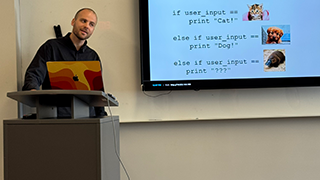Joshua Meyer ’12 Teaches Workshop on Artificial Intelligence and Agentic AI
Friday, November 14, 2025
 Seton Hall University welcomed alumnus Joshua Meyer ’12 for a workshop titled “AI
101,” presented by the Teaching, Learning and Technology Roundtable (TLTR) Artificial
Intelligence Committee on November 12 in the Bishop Dougherty University Center. The
session drew students, faculty and administrators from across campus who were interested
in understanding how modern artificial intelligence tools work and how they can be
used responsibly in academic and professional settings.
Seton Hall University welcomed alumnus Joshua Meyer ’12 for a workshop titled “AI
101,” presented by the Teaching, Learning and Technology Roundtable (TLTR) Artificial
Intelligence Committee on November 12 in the Bishop Dougherty University Center. The
session drew students, faculty and administrators from across campus who were interested
in understanding how modern artificial intelligence tools work and how they can be
used responsibly in academic and professional settings.
TLTR AI Committee co-chair Jessica Rauchberg opened the program with an introduction to the committee’s goals and the broader mission of TLTR, which is to support the thoughtful, ethical and effective use of technology. Rauchberg then introduced Meyer, an AI researcher and industry leader whose work spans language technologies, machine learning and product development. Meyer holds a Ph.D. in automatic speech recognition from the University of Arizona and a B.A. in liberal studies from Seton Hall.
Meyer began by explaining the foundations of large language models, or LLMs, describing them as systems trained to predict the next word in a sequence rather than traditional databases that store and retrieve facts. He demonstrated how this predictive design enables LLMs to generate fluent text, but also makes them prone to errors when attempting tasks such as math or detailed fact recall. Meyer demonstrated live examples of these limitations, including solving simple arithmetic problems.
Meyer then introduced the concept of agentic AI. Agentic systems can call external tools or take actions to complete a task. Using an example of a model triggering a calculator program on a computer to compute 646 plus 101, Meyer illustrated how these agents extend the capabilities of LLMs by connecting them with tools that can perform tasks they cannot reliably handle internally. He emphasized that this shift represents a new frontier in AI development because it links reasoning models with real-world functions and decision-making.
He also addressed common issues, such as hallucinations, in which a model produces confident but incorrect statements. Meyer shared examples that included fabricated biographical details about himself, such as playing football at Seton Hall and in the NFL, and starring on NBC's “The Office”. He demonstrates how these systems can create plausible but false information when presented with a question lacking sufficient context. He reminded attendees that LLMs do not understand truth in a human sense and rely solely on statistical patterns in language.
Meyer also discussed the growing problem of what he called “AI slop,” referring to content that appears polished at a glance but reveals inaccuracies, vague claims, or clear signs of machine generation upon closer inspection. He urged students not to rely solely on AI to produce academic work and advised faculty to remain vigilant about the quality of writing generated by automated tools. He noted that AI should not replace human judgment or creativity and that maintaining “taste” and critical evaluation is essential even as these tools become more advanced.
Throughout the presentation, Meyer emphasized the importance of human control and intentionality in the use of AI. Advising participants to “be the pilot, not the passenger,” he encouraged users to take a managerial approach by providing clear direction, context and constraints. He explained that LLMs perform best when given specific instructions and detailed context. Their performance improves with larger context windows, which enable them to process more text simultaneously.
Meyer concluded by outlining practical ways in which faculty, students, and administrators can utilize AI to accelerate research, organize information, and support creative problem-solving. He emphasized that although AI can assist with processing large volumes of text or identifying patterns, users must still verify results and ensure accuracy.
The TLTR AI Committee, co-chaired by Rauchberg and Ruchin Kansal, researches the effects of AI on higher education, supports policy development, curates best practices for integration and examines implications for the future workplace.
For more information, click here.
Categories: Science and Technology






